

Clinical Decision Support: No Substitute For Doctors' Opinion - Healthcare - Clinical Information Systems. Study finds little improvement in how doctors with access to computerized alerts treat elderly patients with cognitive impairment. 5 Key Elements For Clinical Decision Support Systems (click image for larger view and for slideshow) Clinical informatics professionals and health IT software developers need to reassess how they develop clinical decision support (CDS) tools.
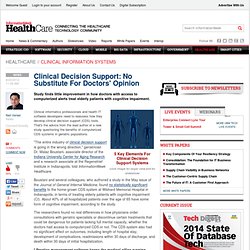
That's the advice from the lead author of a new study questioning the benefits of computerized CDS systems in geriatric populations. "The entire industry of clinical decision support is going in the wrong direction," geriatrician Dr. Boustani and several colleagues, who authored a study in the May issue of the Journal of General Internal Medicine, found no statistically significant benefits to the home-grown CDS system at Wishard Memorial Hospital in Indianapolis, in terms of treating elderly patients with cognitive impairment (CI) . [ Practice management software keeps the medical office running smoothly. More Insights.
Making medication alerts in electronic medical record systems more useful and usable. Public release date: 29-Mar-2012 [ Print | E-mail Share ] [ Close Window ] Contact: Cindy Fox Aisencaisen@iupui.edu 317-274-7722Indiana University School of Medicine INDIANAPOLIS — A study by Regenstrief Institute and U.S.
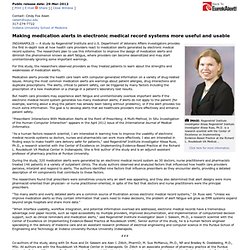
Department of Veterans Affairs investigators provides the first in-depth look at how health care providers react to medication alerts generated by electronic medical record systems. The researchers plan to use this information to improve the design of medication alerts and diminish the phenomenon known as alert fatigue, where providers can become desensitized and may start unintentionally ignoring some important warnings. For this study, the researchers observed providers as they treated patients to learn about the strengths and weaknesses of medication alerts. Medication alerts provide the health care team with computer-generated information on a variety of drug-related issues. Co-authors of the study, along with Dr. Currently Dr. 5 things to know about Watson's role in healthcare. Earlier this year, a robot named Watson beat out two long-time champs on the quiz show Jeopardy, using 200 million pages of structured and unstructured content.
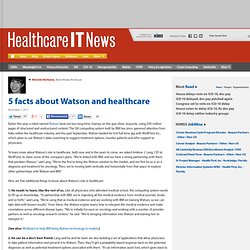
The QA computing system built by IBM has since garnered attention from folks within the healthcare industry, and this past September, Watson landed his first full-time gig with WellPoint Inc., which plans to use Watson’s data-crunching to suggest treatment options, monitor patients and offer support to physicians. To learn more about Watson’s role in healthcare, both now and in the years to come, we asked Andrew J.
Lang, CIO at WellPoint, to share some of the company’s plans. “We’re linked with IBM, and we have a strong partnership with them that predates Watson,” said Lang. “We’re the first to bring the Watson solution to the market, and our first focus is on a diagnosis and treatment for oncology. KLAS asks: Do CDS tools deliver? Healthcare providers are looking to new clinical decision support (CDS) tools to help them improve care.
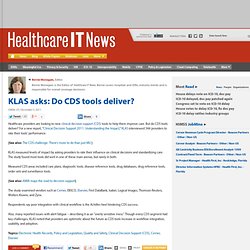
But do CDS tools deliver? For a new report, "Clinical Decision Support 2011: Understanding the Impact," KLAS interviewed 344 providers to rate their tools' performance. Turbocharge Your EHR With Additional Data Sources - Healthcare - Clinical Information Systems. Chances are your clinical information systems are starved for data.
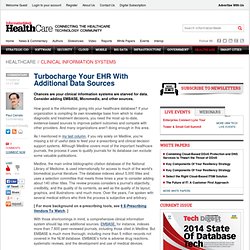
Consider adding EMBASE, Micromedix, and other sources. How good is the information going into your healthcare database? If your organization is compiling its own knowledge base from which to make diagnostic and treatment decisions, you need the most up-to-date, evidence-based sources to improve patient outcomes and compete with other providers. And many organizations aren't doing enough in this area. As I mentioned in my last column, if you rely solely on Medline, you're missing a lot of useful data to feed your e-prescribing and clinical decision support systems.
Medline, the main online bibliographic citation database of the National Library of Medicine, is used internationally for access to much of the world's biomedical journal literature. Dr. Google Will See You Now: Search Can Identify Causes of Health Symptoms. The next time you need to identify a mysterious pain in your body, you could look it up in Google Search, and Google will tell you directly on the results page what might be the possible cause of your symptoms.
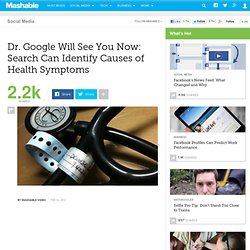
"You might be trying to understand why you’ve had a headache every morning for a week or why your child has a tummy ache all of a sudden," Google Chief Health Strategist Roni Zeiger said in a blog post Monday. Google could tell by looking at its search data that when people typically searched for a symptom, they were interested in learning about possible causes and related conditions. Now Google has removed that second search and includes "searches related to" the symptom and possible causes. SEE ALSO: Google Knowledge Graph Could Change Search Forever "The list is generated by our algorithms that analyze data from pages across the web and surface the health conditions that appear to be related to your search," Zeiger wrote. Check out the video above to learn more.
Watson (artificial intelligence software) Watson is an artificially intelligent computer system capable of answering questions posed in natural language,[2] developed in IBM's DeepQA project by a research team led by principal investigator David Ferrucci.
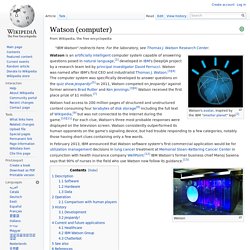
Watson was named after IBM's first CEO and industrialist Thomas J. Watson.[3][4] The computer system was specifically developed to answer questions on the quiz show Jeopardy! Is Your Clinical Database Up to Speed? - Healthcare - Clinical Information Systems. If the scientific data going into these repositories is flawed, so are your clinicians' decisions.
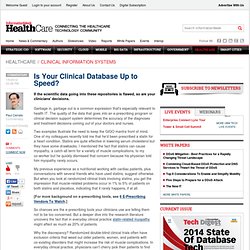
Garbage in, garbage out is a common expression that's especially relevant to health IT. The quality of the data that goes into an e-prescribing program or clinical decision support system determines the accuracy of the diagnoses and treatment decisions coming out of your doctors and nurses. Two examples illustrate the need to keep the GIGO mantra front of mind. One of my colleagues recently told me that he'd been prescribed a statin for a heart condition. Statins are quite effective in lowering serum cholesterol but they have some drawbacks.
My previous experience as a nutritionist working with cardiac patients, plus conversations with several friends who have used statins, suggest otherwise. SimulConsult. Doctors Diagnose in a Jiffy—and Using Common Regions of the Brain. A new view on medicine: How doctors view x-rays; courtesy of Melo M, Scarpin DJ, Amaro E Jr, Passos RBD, Sato JR, et al.
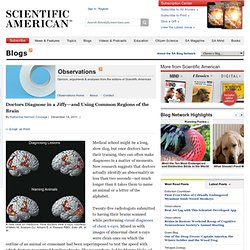
Medical school might be a long, slow slog, but once doctors have their training, they can often make diagnoses in a matter of moments. How doctors make diagnoses. Public release date: 14-Dec-2011 [ Print | E-mail Share ] [ Close Window ] Contact: Yael Francoyfranco@plos.org 415-568-3169Public Library of Science Doctors use similar brain mechanisms to make diagnoses and to name objects, according to a study published in the Dec. 14 issue of the online journal PLoS ONE and led by Marcio Melo of the University of Sao Paulo in Brazil.

Doctors often make diagnoses within their first moments of interaction with a patient. To investigate the neural processes involved in this quick diagnostic process, the researchers used functional MRI scanning to assess the cerebral activity in doctors while they diagnosed lesions in chest X-rays. The results showed that the brain areas active during this task were strikingly similar to those activated while naming line drawings of animals embedded in chest X-rays. Competing Interest Statement: The authors have declared that no competing interests exist. About PLoS ONE All works published in PLoS ONE are Open Access. KLAS asks: Do CDS tools deliver?